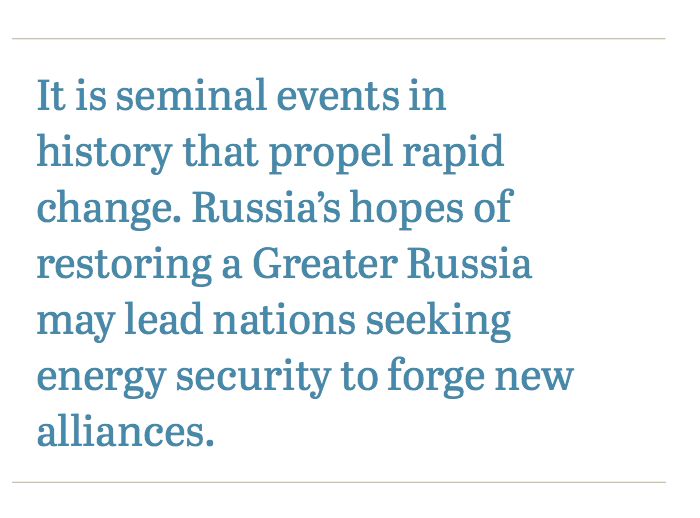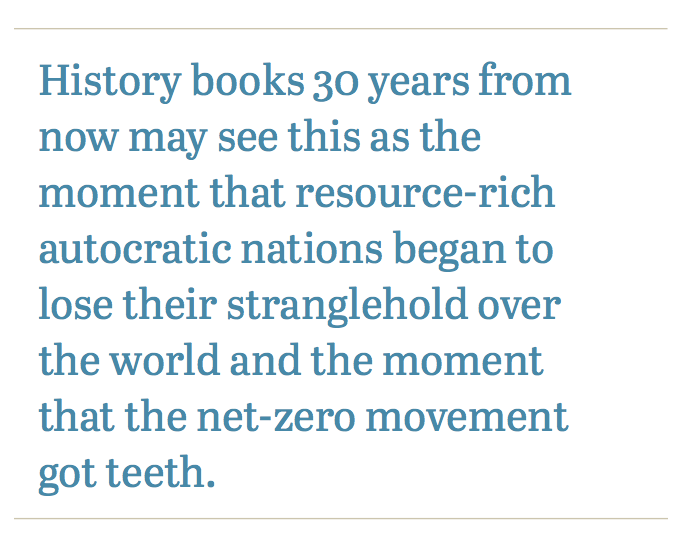A Reckoning of Global Priorities: The Changing Calculus of Climate Change and Geopolitics

Bailard’s Director of Sustainable, Responsible and Impact Investing Blaine Townsend, CIMC®, CIMA® chats with Chief Investment Officer, Eric P. Leve, CFA.
March 31, 2022
Eric P. Leve, CFA: Blaine, you and I share a deep passion for understanding how fundamental, long-term issues affect changes in human behavior and investment markets. Sometimes these bigger themes can cause major changes in the short term, and this certainly feels like one of those times. There has been a profound reckoning in the last decade, that the sources of energy that we use to power our world matter. Today, we face a challenge that most of us have tried to ignore: the fine balance between our clean energy aspirations with our economic, technological, and resource endowments amid the geopolitical reality of the dynamics between energy producing and consuming nations.
Blaine Townsend, CIMC®, CIMA: You’re hitting upon an “inconvenient truth.” In an ideal world, investors wouldn’t support an energy company that derives its revenue from nations without democratic institutions. But what does one do when your allies with deep democratic values (Germany would be my prime example here) desperately need those resources not just to “keep the lights on” but, more critically, to keep its people from freezing in winter? The recent actions of Russia in Ukraine will have profound effects on how the world thinks about its energy transition and a heightened appreciation of the need for energy independence.
Transitioning from unsavory suppliers is one step, but doing it quickly probably means a greater use of “dirty” energy sources. That said, in the long run, the conflict is likely to accelerate innovation and adoption of cleaner alternative solutions.
Eric: For Germany to decrease its energy dependence on Russia, it needs to wean itself from the Nord Stream I gas pipeline, which for the past ten years has supplied 30% of the nation’s natural gas. Russia also provides more than 50% of Germany’s coal. What we’re currently hearing is that Germany’s ambitious goal is to end imports of Russian oil and coal this year, and natural gas by 2024. The key here is that nations can’t simply flip a switch and change their energy infrastructure. If their systems are geared toward natural gas usage, it is hard to quickly transition to new sources, so generally this means finding new sources of natural gas. But, some power plants can make the switch of their fuel source from natural gas to coal. Since coal is found in many places, and is easier to transport than natural gas, we will likely see increased use of coal burning to generate needed power in Europe in the short term.
Indeed, the immediate solutions to this puzzle will likely have offsetting effects from an environmental perspective. Governments should, and may, push their populations to decrease energy use in the near term. For those old enough to remember 1973, they’ll recall gasoline rationing and lower speed limits, along with raising thermostats in the summer and lowering them in winter. But so far this hasn’t happened. European leaders have simply reduced government duties on fossil fuels to lessen the pain on consumers. It may be that, in this time of populism in Europe, leaders may not have the gumption to burden their peoples. With many consumers at wits end after two years of pandemic constraints, asking for more sacrifices may be politically toxic.

The more obvious near-term solution is that governments across Western Europe will likely seek oil, gas, and coal supplies from any sources they can. An uncomfortable silver lining is that the world’s biggest energy consumer is currently using a lot less. China was already expecting sharply lower economic growth this year than last, but with the huge spike in COVID across the country and the virtual lockdown of the world’s third most populous city (Shanghai), China’s energy consumption will be much lower than normal.
This leaves more resources for the rest of the world, putting a (small) damper on price increases.
Blaine: It is seminal events in history that propel rapid change. Russia’s hopes of restoring a Greater Russia may lead nations seeking energy security to forge new alliances. Neighbors, allies, and frenemies will quickly react to the heightened risk of an unpredictable and militaristic supplier.
In quick order, Germany has pivoted to a potential new gas deal with the world’s largest exporter of liquefied natural gas, Qatar. For now, this seems like a relatively healthy move away from dependency on a dangerous autocratic government toward a nation looking to build bridges with the west, and one becoming a global, rapidly-modernizing autocracy. A broader, multinational sourcing of fuels will provide Germany, and Europe in general, a more dependable flow of natural gas as they transition to next-generation solutions. Indeed, we may look back upon this era as one that helped created a broader array of multilateral relationships among countries that previously shared few bonds.
Eric: Looking beyond Germany, the needs and resources of the countries of Europe vary dramatically. Nations such as France and Sweden generate much of their domestic energy from nuclear power, more than 40% and 30%, respectively. Sweden generates almost one-half of its electricity from hydroelectric sources and about 17% from wind. Denmark generates 45% of its energy from wind. But 45% of Poland’s energy comes from coal and much of the rest from natural gas, both primarily imported from Russia.
As a transitional solution to even more sustainable solutions, nuclear could play a key role across much of the European continent. But instead of the large-scale plants that take years and decades for approval and construction, a new generation of nuclear plants called small modular reactors (SMRs) can be constructed in as little as 500 days. These plants have much smaller physical footprints and use their nuclear fuel more effectively, leading to much less spent fuel needing to be sequestered. A single one of these SMRs can provide energy for more than 300,000 homes. Still, we are seeing countries such as the United Kingdom push for the newer-generation large scale nuclear plants as a step to wean themselves off imported natural gas.
But Blaine, I’d argue that the more exciting potential outcome of this crisis is the potential for an accelerated path to truly local and sustainable forms of energy generation.

Blaine: And so we get to a critical point. As the “trade cold war” with China over the past few years motivates countries and companies to depend less on foreign suppliers and bring manufacturing closer to home, Russia’s aggressions will likely accelerate the transition to renewable energy sources, many of which can be produced domestically, depending on one’s geography and geology. This will not be easy. It will require multitrillion-dollar global investments. The acceleration of this transition is one reason we continue to be supportive of companies that benefit from this broad infrastructure transition.
And it is this longer-term scenario that is exciting for me. In the same manner that World War II led to the formation of the United Nations and to historic capital spending globally, or how increased globalization and increased trade did the same in the early 2000s, we are on the brink of an historic, secular investment in alternative fuels that now has a critical catalyst. Primary capital expenditures for energy have been falling globally for eight years since the previous oil price spike above $100 per barrel. But now we have dual needs: increasing natural gas and other carbon-based energy infrastructure in the intermediate term, while at the same time developing next-generation energy sources that support longer-term goals of net zero emissions. These efforts can create energy independence for a broader range of countries.
Global expenditures for these two efforts may quickly surpass the previous peak of energy infrastructure spending of about $2 trillion annually in order to supply the world’s still growing energy needs. Goldman Sachs estimates that it will take $56 trillion of investment through 2050 to build a credible, global clean energy infrastructure. It is a tragedy that the invasion of a sovereign nation has been required to jumpstart this, but it isn’t all that dissimilar to the revolution in automobile gas efficiency spurred by the 1973 ArabIsraeli War and OPEC’s oil embargo against the United States. History books 30 years from now may see this as the moment that resource-rich autocratic nations began to lose their stranglehold over the world and the moment that the net-zero movement got teeth.
Eric: Blaine, thanks so much for sharing your insights. As Winston Churchill said, “never let a good crisis go to waste.”
Recent Insights
Bailard Appoints Dave Harrison Smith, CFA, as Chief Investment Officer
Bailard is pleased to announce that, as of today, Dave Harrison Smith, CFA, has been promoted to Chief Investment Officer. He succeeds Eric Leve, CFA, who held the role for more than a decade and will continue with the firm as a portfolio manager, fully focused on international markets.
July 1, 2025
Country Indices Flash Report – June 2025
Tariff negotiations intensified as the July 9th reciprocal tariff deadline nears, though the Trump administration signaled flexibility on the cutoff for countries negotiating in “good faith.” The U.S. and China secured a high-level framework that included a key rare earths deal and a tariff truce extension to August 11th. Meanwhile, the UK finalized a 10% tariff rate after a threatened 27.5%; talks are swiftly progressing with the EU.
June 30, 2025
Mike Faust Awarded 2025 Advisors to Watch by AdvisorHub
Michael Faust, CFA, ranked in the top five of AdvisorHub’s Advisors to Watch for the second year—recognizing his standout leadership at Bailard.
June 24, 2025
Keep Informed
Get the latest News & Insights from the Bailard team delivered to your inbox.